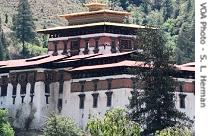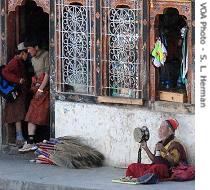2007年VOA标准英语-Bhutan Welcomes Visitors, Just Not Too Many and
时间:2019-01-04 作者:英语课 分类:2007年VOA标准英语(五月)
Thimpu, Bhutan
21 May 2007
To the outside world the small Buddhist 1 kingdom of Bhutan is regarded as a modern-day Shangri-La. Nestled along the eastern side of the Himalayas, wedged between Tibet and India, Bhutan sees few outsiders. And the country likes it that way as it attempts to preserve its fragile culture and ecology. That has prompted Bhutan to strictly 2 regulate tourism. But as VOA's Steve Herman reports from Thimpu, it is possible for anyone with enough money and determination to visit.
Here people call their nation Druk Yul - land of the thunder dragon. The sights and sounds of its deep connection to Tibetan Buddhism 3 are evident just about anywhere a visitor goes.
A religious musician, playing the jaling oboe, dressed in the traditional knee-length gown and huge white cuffs 4 worn by most Bhutanese men is just one example of why this country the size of Switzerland is so appealing to travelers.

Bhutan's architectural style wows visitors
The country is permeated 5 with fortresses 6, known as dzongs, and monasteries 7. The air is crisp and clean, the views of mountains breathtaking. What Bhutan lacks in high-end tourist infrastructure 8 it makes up in courtesy, safety and cleanliness, especially compared to other major regional destinations.
Yet, Bhutan remains 9 one of international tourism's best-kept secrets. It attracts less than 20,000 tourists a year, not including thousands more Indians, here on business or holiday, who do not need a visa to visit.
The head of the association representing Bhutan's 290 tour operators, Sonam Dorji, says the myth persists that the country is virtually off-limits to visitors. Tourists have been welcomed since 1974. But Dorji says there will be no attempt to undertake a mass-marketing 10 campaign, unlike Bhutan's neighbors against which it competes for tourist revenue.
"By not marketing we still remain exclusive and a very mysterious country," he said. "We don't have any limits of arrivals. As long as they pay $180 per night, they are welcome."
That may sound like a steep price, but it includes accommodations, meals, guides and transportation.
Most visitors come for the trekking 11, bird watching or just to absorb the unique culture of this deeply religious and agrarian 12 society. Many typical tourist pursuits, however, are off-limits, such as mountain climbing or recreational fishing. Local people consider their mountains sacred and inhabited by deities 13. Fishing for sport also violates religious sensibilities.
Dorji, head of the Association of Bhutanese Tour Operators, says religious values cannot be compromised in the name of increasing tourism.

An old monk chants prayers on a street corner in Paro
"Buddhist religion overall is just like to protect even the environment, the sentient 15 beings, all living beings. And we believe that even a tree has a soul. So that's the part which has influenced the tourism policy," added Dorji.
There is a fierce determination here to protect the environment. After all, it is natural resources which provide Bhutan with its primary source of revenue - sales of hydro-electric power to its energy-hungry neighbor, India. Tourism is the top source of hard currency.
Although tourism officials say Bhutan can absorb tens of thousands more visitors per year, if they come during the off-season, there is a fear that making it less costly 16 for outsiders to visit could easily swamp this country of less than 700,000 people.
"Being small, you cannot be careless. We cannot promote and develop normal type of tourism here because we simply do not have the carrying capacity. We have, yes, rich culture, living culture, ancient culture, but they're still very fragile," said former ambassador Lhatu Wangchuk, the director general of Bhutan's department of tourism.
Those who do visit are warmly welcomed. Wangchuk believes that is because experience with well-healed visitors, who tend to be older and highly educated, has had a "very positive" impact on Bhutanese people and their culture.
"It is the tourists who have been educating the Bhutanese. We get tourists who are well traveled, tourists who are very sensitive to other countries' culture, their way of life. And therefore we've been made more aware of the value of our own culture," continued Wangchuk.
But there is a bit of trouble in paradise. There are complaints that the modest number of trekkers are damaging Bhutan's environment, leaving behind litter and eroding 17 habitat in a country where three-quarters of the land is unspoiled forest.
In the few cities, such as the capital of Thimpu, and Paro, where the main airport is located, packs of stray dogs wander the streets barking loudly at night and garbage disposal is an increasing problem.
But most Bhutanese, such as this elderly monk chanting Tibetan prayers on the sidewalk, remain unfazed by the modest number of outsiders and the potential benefits or problems they bring.
As Bhutanese are apt to exclaim, drawing on centuries of Buddhist wisdom, the only thing that is constant is change. They believe that their values and the wisdom of their enlightened leaders in a country now shifting from absolute monarchy 18 to parliamentary democracy will prevail and allow their way of life to be preserved.
- The old lady fell down in adoration before Buddhist images.那老太太在佛像面前顶礼膜拜。
- In the eye of the Buddhist,every worldly affair is vain.在佛教徒的眼里,人世上一切事情都是空的。
- His doctor is dieting him strictly.他的医生严格规定他的饮食。
- The guests were seated strictly in order of precedence.客人严格按照地位高低就座。
- Buddhism was introduced into China about 67 AD.佛教是在公元67年左右传入中国的。
- Many people willingly converted to Buddhism.很多人情愿皈依佛教。
- a collar and cuffs of white lace 带白色蕾丝花边的衣领和袖口
- The cuffs of his shirt were fraying. 他衬衣的袖口磨破了。
- The smell of leather permeated the room. 屋子里弥漫着皮革的气味。
- His public speeches were permeated with hatred of injustice. 在他对民众的演说里,充满了对不公正的愤慨。
- They will establish impregnable fortresses. 他们将建造坚不可摧的城堡。
- Indra smashed through Vritra ninety-nine fortresses, and then came upon the dragon. 因陀罗摧毁了维他的九十九座城堡,然后与维他交手。 来自神话部分
- In ancient China, there were lots of monasteries. 在古时候,中国有许多寺院。
- The Negev became a religious center with many monasteries and churches. 内格夫成为许多庙宇和教堂的宗教中心。
- We should step up the development of infrastructure for research.加强科学基础设施建设。
- We should strengthen cultural infrastructure and boost various types of popular culture.加强文化基础设施建设,发展各类群众文化。
- He ate the remains of food hungrily.他狼吞虎咽地吃剩余的食物。
- The remains of the meal were fed to the dog.残羹剩饭喂狗了。
- They are developing marketing network.他们正在发展销售网络。
- He often goes marketing.他经常去市场做生意。
- She can't come pony trekking after all because she's in a delicate condition. 她结果还是不能坐小马车旅行,因为她已怀孕。 来自《简明英汉词典》
- We spent the summer trekking in the foothills of the Himalayas. 我们整个夏天都在喜马拉雅山的山麓艰难跋涉。 来自互联网
- People are leaving an agrarian way of life to go to the city.人们正在放弃农业生活方式而转向城市。
- This was a feature of agrarian development in Britain.这是大不列颠土地所有制发展的一个特征。
- Zeus and Aphrodite were ancient Greek deities. 宙斯和阿佛洛狄是古希腊的神。 来自《简明英汉词典》
- Taoist Wang hesitated occasionally about these transactions for fearof offending the deities. 道士也有过犹豫,怕这样会得罪了神。 来自汉英文学 - 现代散文
- The man was a monk from Emei Mountain.那人是峨眉山下来的和尚。
- Buddhist monk sat with folded palms.和尚合掌打坐。
- The living knew themselves just sentient puppets on God's stage.生还者认识到,他们不过是上帝的舞台上有知觉的木偶而已。
- It teaches us to love all sentient beings equally.它教导我们应该平等爱护一切众生。
- It must be very costly to keep up a house like this.维修这么一幢房子一定很昂贵。
- This dictionary is very useful,only it is a bit costly.这本词典很有用,左不过贵了些。
- The coast is slowly eroding. 海岸正慢慢地被侵蚀。
- Another new development is eroding the age-old stereotype of the male warrior. 另一个新现象是,久已形成的男人皆武士的形象正逐渐消失。